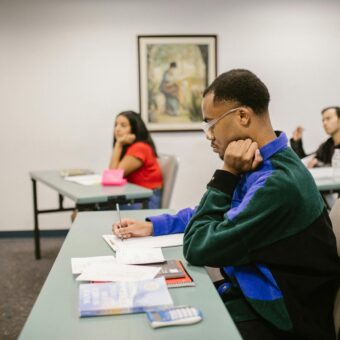
By Kunal Chan Mehta Article Date: 1st September 2021
As employers look to their CEOs for compassion, confidence and control to navigate them towards optimism and opportunity, a surfeit of questions remain unrequited about what the post-pandemic future will hold. As COVID-19 fast-tracks developments such as digital collaboration and organisational transformation, FSB asks the experts what awaits ahead amid the current economic and social unrest.
Rethinking the corporate future
As the world turns upside down during the COVID-19 calamity, countless corporations continue to be disrupted and deconstructed. The CBI distributive trade survey outlines that trading conditions for the entire commerce sector remain challenged, even against the backdrop of businesses gently bouncing back from the early lockdown.
Discussing the demand for CEOs to stay sanguine and sustain sanity, Marco Amitrano, Head of Clients and Markets at PricewaterhouseCoopers (PwC), told FSB: ‘CEOs are looking at this moment in time as an opportunity to reset – to rethink – to reconfigure – what they do and how they do it.’
From coping with a catastrophic health crisis – to addressing longstanding racial injustices – the scale, speed and space of the pandemic poses shocking challenges for CEOs in today’s institutions. Marco Amitrano added: ‘Very few UK CEOs are contemplating a return to how things were before the pandemic. The vast majority (86%) of respondents to the PwC CEO Panel Survey believe the shift towards remote collaboration will endure and many respondents are prioritising the digital transformation of core business operations and planning for a world where there are fewer people in offices and more working remotely.’
Throughout any crisis, CEO leadership becomes more crucial than ever. As the pandemic is filtering out weak leaders, the strong receive approbation and set new standards as the culture of leadership and life is converting in real-time. With the ‘old-normal’ cancelled, the struggle for a ‘developing-normal’ is playing out in new formats amid street protests, market collapses and economic uncertainty.
Refining the economy reality
The economic reality is not so straightforward: there is no likelihood of any vigorous recovery until the virus is entirely under control. The pandemic is poised to plummet the global economy into its deepest recession since World War Two, with The World Bank asserting that this will be more than twice as bad as the 2008 financial crash.
Commenting on GDP and productivity figures for June and the second quarter, Jonathan Athow, ONS Deputy National Statistician and Director General for Economic Statistics, told FSB: ‘The recession brought on by the coronavirus pandemic has led to the biggest fall in quarterly GDP on record. The economy began to bounce back in June with shops reopening, factories beginning to ramp up production and housebuilding continuing to recover. Despite this, GDP in June still remains a sixth below its level in February, before the virus struck.’
The UK, now officially in the largest recession this country has ever known, saw its economy tumble by 20% between April and June as the pandemic boarded-up businesses and kept people locked up at home.
Across the Atlantic, Americans are nearly six months immersed in a historic economic crisis. From February to April, the country’s unemployment rate bolstered from under 4 per cent to 15 per cent.
Examining the latest inflation figures, published by the ONS, Ian Stewart, Chief Economist at Deloitte, told FSB: ‘We are in a disinflationary world of abundant spare capacity, rising unemployment and weak pay growth.’ Referring to the lockdown financial tumult, Ian asserted: ‘Inflation will remain muted until the economy makes up the huge loss of activity sustained in the first half of this year.’
Reinventing competitiveness through coopetition
‘Although the aforesaid current COVID-19 challenges create exceptional difficulties to trade, it is during the greatest problems that the most pioneering solutions arise,’ said Mr Mohammed Zaidi, FSB’s Deputy CEO. ‘Resultantly, today’s struggles are forcing new ways of working, thinking and approaching problems to sustain competitiveness.’
Speaking with FSB about how organisations can sustain such competitiveness, Peter Williamson, a world-renowned Professor of International Management, University of Cambridge, added: ‘To succeed in the face of disruption, companies will need to harness the power of a wide range of partners who can bring different skills, experience, capacity, and their own networks to the task.’
Concerning coopetition and partner ecosystems, Professor Williamson continued: ‘Whether it is keeping their supply chains moving, redeploying their staff to new roles, or pivoting their business models to on-line sales, companies across the world are coming to see the quality and depth of the partner ecosystems are critical. Innovative responses require access to the capabilities that go beyond those that are inside their companies.’
Amy Edmondson, a Professor of Leadership and Management, Harvard University, who has received worldwide recognition for her research, told FSB: ‘An organisation today can only sustain competitiveness in the face of profound upheaval by truly becoming “a learning organisation” – capable of rapid agile, team-based learning focused on what is happening in its environment and on how to create new responses in an ongoing way.’
Building back better
Lenin’s statement ‘There are decades where nothing happens and there are weeks where decades happen’ aligns perfectly with the pandemic’s imperfections that have pushed CEOs into thinking and working differently. Although uncomfortable, this has also been a renaissance to rethink past ways of working with technology and business processes to embrace learning and coopetition.
COVID-19 will continue to operate as a catalyst for change. Many CEOs now understand that they do not need to emerge from lockdown with a new attitude and set of skills but rather that it is okay to continue being who they are. The future will be brighter — and there is cause for hope. After all, tomorrow will be improved by the struggles faced today – and, as history teaches us, CEOs will help build back better than before.
Acknowledgement
FSB extends its gratitude to Ryan May, National Accounts Coordination Division, Office for National Statistics, for his support.
